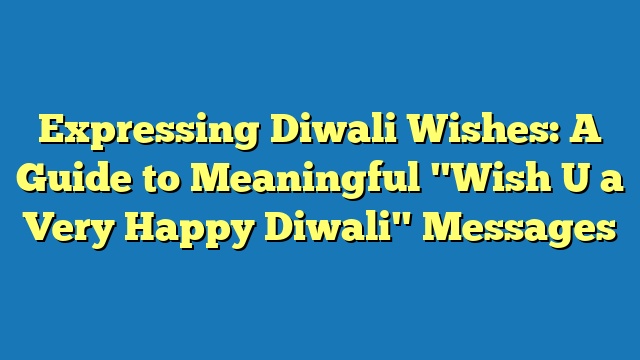The phrase “wish ua very happy diwali messages” refers to extending well wishes and greetings for the Hindu festival of lights, Diwali. For example, one might send a message saying, “Wish you a very happy Diwali filled with joy, prosperity, and good fortune.”
Exchanging Diwali messages is an important part of celebrating the festival, as it allows individuals to connect with loved ones and convey their heartfelt greetings. It fosters a sense of community and togetherness during this special time. Historically, people would exchange handwritten letters or visit each other’s homes to offer Diwali wishes. Today, technology has made it easier to share messages through social media, instant messaging apps, and other digital platforms.
This article will delve deeper into the significance of exchanging Diwali messages, explore different ways to express your wishes, and provide tips for creating meaningful and memorable greetings.
wish ua very happy diwali messages
The tradition of exchanging “wish ua very happy diwali messages” carries significant cultural and personal importance, particularly during the Diwali festival. These messages serve multiple purposes, including:
- Expressing well wishes
- Conveying blessings
- Strengthening bonds
- Promoting joy and happiness
- Sharing festive cheer
- Honoring the significance of Diwali
- Preserving cultural traditions
- Fostering a sense of community
- Spreading positivity and goodwill
These aspects highlight the multifaceted nature of Diwali messages, emphasizing their role in enhancing the festive experience and reinforcing the rich cultural heritage associated with Diwali.
Expressing well wishes
Expressing well wishes is a fundamental aspect of “wish ua very happy diwali messages,” serving as the primary intention behind these messages. Diwali, a festival of lights celebrated by Hindus, Sikhs, and Jains, symbolizes the triumph of good over evil and the renewal of life. Exchanging Diwali messages is a tradition that conveys heartfelt greetings, blessings, and good wishes for the upcoming year.
These messages often include expressions of joy, prosperity, health, and happiness. By sending Diwali messages, individuals can convey their well wishes to loved ones, friends, colleagues, and acquaintances, strengthening their bonds and spreading festive cheer. The act of expressing well wishes through Diwali messages reinforces the spirit of the festival and promotes a sense of togetherness and goodwill.
In essence, “wish ua very happy diwali messages” are a tangible manifestation of expressing well wishes during the Diwali festival. These messages serve as a vehicle for conveying heartfelt greetings, blessings, and hopes for a prosperous and joyful new year. Understanding this connection helps us appreciate the cultural significance of Diwali messages and their role in fostering a positive and festive atmosphere.
Conveying blessings
Within the context of “wish ua very happy diwali messages,” conveying blessings holds immense significance as it embodies the essence of Diwali, a festival that celebrates the triumph of good over evil and the renewal of life. Diwali messages often carry heartfelt blessings, conveying well wishes and aspirations for the recipient’s happiness, prosperity, and overall well-being.
-
Divine blessings
Diwali messages often invoke divine blessings, seeking favor and protection from deities associated with the festival, such as Lakshmi, the goddess of wealth and prosperity, and Ganesha, the remover of obstacles. These blessings are believed to bring good fortune, success, and spiritual growth.
-
Health and well-being
Many Diwali messages convey blessings for good health and physical well-being. They express well wishes for the recipient’s physical and mental strength, longevity, and freedom from illness. These blessings acknowledge the importance of good health as a foundation for happiness and prosperity.
-
Harmony and relationships
Diwali messages also convey blessings for harmonious relationships and a supportive family environment. They express well wishes for peace, unity, and love among family members, friends, and colleagues. These blessings recognize the value of strong relationships in fostering happiness and fulfillment.
-
Success and prosperity
Diwali messages often extend blessings for success and prosperity in various aspects of life, including career, business, and personal endeavors. They express well wishes for financial abundance, professional growth, and the achievement of goals. These blessings reflect the belief that Diwali is an auspicious time to seek blessings for material and spiritual prosperity.
Conveying blessings through Diwali messages is a meaningful tradition that reinforces the spirit of the festival. These blessings embody the hope, optimism, and well wishes that people share during this time of celebration. By sending Diwali messages with heartfelt blessings, individuals can express their love, care, and aspirations for the happiness and prosperity of their loved ones.
Strengthening bonds
The tradition of exchanging “wish ua very happy diwali messages” is deeply intertwined with the concept of strengthening bonds. During Diwali, people send messages to their loved ones, friends, colleagues, and acquaintances to convey their well wishes and blessings for the upcoming year. This act of sending Diwali messages serves as a powerful way to reinforce and nurture relationships.
Diwali messages often express heartfelt sentiments of love, gratitude, and well wishes. By sending these messages, individuals demonstrate their care and affection for the recipient, fostering a sense of connection and belonging. The exchange of Diwali messages helps maintain and strengthen bonds, even among those who may be geographically separated. Moreover, it allows individuals to reconnect with old friends and acquaintances, reviving cherished memories and rekindling bonds.
Real-life examples of how Diwali messages strengthen bonds are abundant. For instance, a Diwali message from a close friend can brighten one’s day and make them feel valued and remembered. A heartfelt message from a family member can bridge distances and reaffirm the strength of familial bonds. Even a simple Diwali greeting from a colleague can foster a sense of camaraderie and goodwill in the workplace.
Understanding the connection between “wish ua very happy diwali messages” and strengthening bonds is crucial for appreciating the cultural and social significance of this tradition. By sending Diwali messages, individuals not only convey their well wishes but also invest in their relationships, fostering a sense of community and togetherness during this festive occasion.
Promoting joy and happiness
The tradition of exchanging “wish ua very happy diwali messages” is deeply intertwined with the concept of promoting joy and happiness. Diwali is a festival that celebrates the triumph of good over evil and the renewal of life. During this time, people send messages to their loved ones, friends, and acquaintances to convey their well wishes and blessings. These messages often express heartfelt sentiments of joy, gratitude, and well wishes, contributing to the overall festive atmosphere and spreading happiness among individuals.
-
Fostering a sense of community
Diwali messages help foster a sense of community and togetherness. By sending and receiving these messages, individuals feel connected to a larger group of people who are celebrating the festival. This sense of belonging and shared joy contributes to the overall happiness and well-being of individuals during Diwali.
-
Expressing gratitude and appreciation
Diwali messages often express gratitude and appreciation for the good things in life. People take this opportunity to thank their loved ones, friends, and colleagues for their support and presence in their lives. Expressing gratitude has been scientifically linked to increased happiness and well-being.
-
Spreading positivity and cheer
The act of sending Diwali messages is itself a positive and cheerful gesture. These messages carry with them an aura of joy and optimism, which can uplift the spirits of the recipient. Even a simple Diwali greeting can bring a smile to someone’s face and contribute to the overall festive cheer.
-
Strengthening relationships
Diwali messages can help strengthen relationships and bring people closer together. Sending thoughtful and heartfelt messages to loved ones and friends demonstrates care and affection, which can deepen bonds and foster a sense of closeness. This, in turn, contributes to the overall happiness and well-being of individuals.
In conclusion, the tradition of exchanging “wish ua very happy diwali messages” plays a significant role in promoting joy and happiness during the Diwali festival. By fostering a sense of community, expressing gratitude and appreciation, spreading positivity and cheer, and strengthening relationships, these messages contribute to the overall festive atmosphere and enhance the well-being of individuals. Understanding this connection helps us appreciate the cultural and social significance of Diwali messages and their role in creating a joyful and harmonious Diwali celebration.
Sharing festive cheer
Sharing festive cheer is an integral part of Diwali celebrations and plays a crucial role in enhancing the significance of “wish ua very happy diwali messages.” Exchanging Diwali messages is a tradition that goes beyond conveying well wishes; it is about spreading joy, warmth, and festive spirit among loved ones, friends, and the community.
Diwali messages become a medium for sharing festive cheer by expressing heartfelt greetings,, and good wishes for the upcoming year. These messages often incorporate elements of the Diwali festival, such as lights, fireworks, sweets, and family gatherings, to create a vibrant and celebratory atmosphere. By sending Diwali messages, individuals not only convey their well wishes but also contribute to the overall festive spirit and joy associated with Diwali.
Real-life examples of sharing festive cheer through Diwali messages abound. For instance, a Diwali message that includes a picture of a beautifully lit diya or a rangoli design can instantly evoke the festive mood and bring a smile to the recipient’s face. Similarly, a message that shares a traditional Diwali recipe or a heartwarming story related to the festival can spread festive cheer and foster a sense of shared cultural heritage.
Understanding the connection between “Sharing festive cheer” and “wish ua very happy diwali messages” is crucial for fully appreciating the cultural and emotional significance of this tradition. By incorporating elements of festive cheer into their Diwali messages, individuals can create a more meaningful and joyful experience for themselves and their loved ones. This understanding can also guide the creation of thoughtful and heartfelt Diwali messages that truly capture the spirit of the festival.
Honoring the significance of Diwali
Honoring the significance of Diwali plays a crucial role in crafting meaningful and authentic “wish ua very happy diwali messages.” Diwali, a festival of lights celebrated by Hindus, Sikhs, and Jains, holds deep cultural and religious significance. Understanding and honoring this significance allows individuals to create Diwali messages that are not only well-wishing but also respectful and reflective of the festival’s true spirit.
One of the key ways in which Diwali messages honor the significance of Diwali is by incorporating traditional elements and symbols associated with the festival. For instance, many Diwali messages include references to diyas (earthen lamps), rangoli designs (colorful floor art), fireworks, and traditional sweets. These elements serve as visual and sensory cues that evoke the festive atmosphere and remind the recipient of the cultural and religious context of Diwali.
Another way in which Diwali messages honor the significance of Diwali is by conveying heartfelt wishes and blessings that align with the festival’s themes and values. For example, Diwali messages often express wishes for prosperity, happiness, health, and the triumph of good over evil. These wishes resonate with the core beliefs and aspirations associated with Diwali, making the messages more meaningful and relevant to the recipient.
Understanding the connection between honoring the significance of Diwali and crafting “wish ua very happy diwali messages” is essential for creating messages that are culturally sensitive, respectful, and reflective of the true spirit of the festival. By incorporating traditional elements, symbols, and heartfelt wishes that align with Diwali’s themes and values, individuals can create Diwali messages that honor the significance of the festival and spread joy, warmth, and festive cheer.
Preserving cultural traditions
Preserving cultural traditions is intricately connected to the significance and impact of “wish ua very happy diwali messages.” Diwali, a festival of lights celebrated by Hindus, Sikhs, and Jains, holds immense cultural and religious importance. “Wish ua very happy diwali messages” serve as a means to convey well wishes, blessings, and festive cheer during this special occasion.
The practice of sending Diwali messages plays a crucial role in preserving cultural traditions by perpetuating customs, values, and beliefs associated with the festival. These messages often incorporate traditional elements, symbols, and greetings that have been passed down through generations. By exchanging Diwali messages, individuals participate in a time-honored tradition that reinforces cultural identity and strengthens the bonds within communities.
Real-life examples abound that showcase how Diwali messages contribute to preserving cultural traditions. In India, families and friends gather to create intricate rangoli designs on the floor, a traditional art form that symbolizes prosperity and good luck. These designs are often shared through Diwali messages, allowing individuals to appreciate and celebrate this cultural practice. Additionally, traditional Diwali sweets, such as ladoos and gulab jamuns, are often mentioned in Diwali messages, fostering a sense of nostalgia and connection to culinary traditions.
Understanding the connection between preserving cultural traditions and “wish ua very happy diwali messages” is essential for appreciating the significance of this tradition. By incorporating traditional elements and symbols into their Diwali messages, individuals not only convey well wishes but also contribute to the preservation and transmission of their cultural heritage. This understanding can guide the creation of meaningful and authentic Diwali messages that honor the festival’s rich cultural traditions.
Fostering a sense of community
Diwali, celebrated as the festival of lights, signifies the victory of good over evil and epitomizes the spirit of togetherness. “Wish ua very happy diwali messages” are more than just well wishes; they are a way to strengthen bonds and foster a sense of community during this festive occasion.
-
Strengthening bonds
Diwali messages serve as a bridge between loved ones, bridging distances and reaffirming the strength of connections. The act of sending and receiving these messages fosters a sense of belonging and reinforces the bonds that unite families and friends.
-
Preserving traditions
Diwali messages often incorporate traditional greetings, cultural symbols, and references to mythological tales. By doing so, they contribute to the preservation of cultural heritage and traditions, ensuring that future generations can continue to experience the richness of the festival.
-
Promoting empathy and compassion
Diwali messages encourage empathy and compassion by reminding us of the shared experiences and challenges faced by our community. These messages cultivate a sense of unity and support, encouraging individuals to extend a helping hand to those in need.
-
Celebrating diversity
Diwali is a festival celebrated across various cultures and traditions. “Wish ua very happy diwali messages” reflect this diversity, acknowledging and embracing the unique ways in which different communities celebrate the festival. This fosters a sense of inclusivity and celebrates the beauty of cultural diversity.
These facets of “Fostering a sense of community” underscore the profound impact of Diwali messages in strengthening bonds, preserving traditions, promoting empathy and compassion, and celebrating diversity. Through these messages, individuals not only convey well wishes but also contribute to the fabric of their community, making the festival of lights a truly collective celebration.
Spreading positivity and goodwill
The tradition of exchanging “wish ua very happy diwali messages” is deeply intertwined with the act of spreading positivity and goodwill. Diwali, a festival of lights celebrated by Hindus, Sikhs, and Jains, symbolizes the triumph of good over evil and the renewal of life. During this time, people send messages to their loved ones, friends, and acquaintances to convey their well wishes and blessings for the upcoming year. These messages often express heartfelt sentiments of joy, gratitude, and hope, contributing to the overall festive atmosphere and spreading positivity and goodwill among individuals.
One of the key ways in which Diwali messages spread positivity and goodwill is by focusing on the shared values of love, compassion, and unity. These messages often emphasize the importance of coming together as a community to celebrate the festival and to support one another. By conveying these positive and uplifting messages, individuals can help to create a more harmonious and joyful environment for themselves and for those around them.
Real-life examples of how Diwali messages spread positivity and goodwill abound. For instance, a Diwali message that encourages individuals to donate to a charitable cause or to volunteer their time to help those in need can inspire others to do the same. Similarly, a Diwali message that shares a story of hope or resilience can uplift the spirits of the recipient and remind them of the positive aspects of life.
Understanding the connection between spreading positivity and goodwill and “wish ua very happy diwali messages” is crucial for appreciating the cultural and social significance of this tradition. By incorporating positive and uplifting messages into their Diwali greetings, individuals can contribute to a more positive and harmonious Diwali celebration and spread joy and goodwill throughout their community.
Frequently Asked Questions about “Wish ua very happy diwali messages”
This section addresses common questions and concerns regarding the tradition of exchanging “wish ua very happy diwali messages” during the Diwali festival.
Question 1: What is the significance of exchanging Diwali messages?
Exchanging Diwali messages is a way to convey well wishes, blessings, and festive cheer to loved ones, friends, and acquaintances. These messages often express heartfelt sentiments of joy, gratitude, and hope, contributing to the overall festive atmosphere.
Question 2: What are some common themes found in Diwali messages?
Common themes in Diwali messages include expressions of joy, prosperity, health, and happiness. They may also convey blessings for success, harmony, and the fulfillment of hopes and aspirations.
Question 3: How can I create meaningful Diwali messages?
To create meaningful Diwali messages, consider incorporating personal touches, such as specific well wishes or memories shared with the recipient. Use heartfelt language and genuine expressions of joy and gratitude.
Question 4: What are some creative ways to share Diwali messages?
In addition to traditional text messages, Diwali messages can be shared through social media posts, email, or video messages. Consider using festive visuals, such as images of diyas or rangoli designs, to enhance the message.
Question 5: Is it appropriate to send Diwali messages to people of other faiths or cultures?
Yes, it is appropriate to send Diwali messages to people of other faiths or cultures. Diwali is a festival that celebrates the triumph of good over evil and the renewal of life, themes that resonate with people from all backgrounds.
Question 6: When is the best time to send Diwali messages?
Diwali messages can be sent anytime during the Diwali festival, which typically lasts for five days. However, many people choose to send messages on the main day of Diwali, known as Lakshmi Puja or Diwali Puja.
These FAQs provide a brief overview of the significance, themes, and etiquette surrounding “wish ua very happy diwali messages.” By understanding these aspects, individuals can create and share meaningful Diwali messages that spread joy, goodwill, and festive cheer during this special occasion.
The next section of this article will explore creative ideas for crafting unique and memorable Diwali messages.
Tips for Crafting Unique and Memorable “Wish ua very happy diwali messages”
Crafting unique and memorable Diwali messages requires attention to detail, creativity, and cultural sensitivity. Here are five tips to help you create Diwali messages that stand out:
1. Personalize your messages
Avoid generic greetings and instead tailor your messages to the recipient. Mention something specific about your relationship or shared experiences to make your message more meaningful.
2. Incorporate cultural elements
Diwali is a festival rich in cultural traditions and symbolism. Incorporate elements such as diyas, rangoli designs, or mythological references into your messages to add a touch of authenticity.
3. Use creative visuals
If you’re sharing your messages on social media or via email, consider using festive visuals such as images of diyas, fireworks, or rangoli designs to enhance the visual appeal of your message.
4. Keep it concise
While you want your message to be meaningful, it’s important to keep it concise. People are more likely to read and appreciate a brief and impactful message.
5. Proofread your messages
Before sending your Diwali messages, take the time to proofread them carefully for any errors in grammar or spelling. A well-written message reflects your thoughtfulness and attention to detail.
By following these tips, you can create Diwali messages that are not only well-wishing but also unique, memorable, and culturally sensitive. These messages will undoubtedly bring joy and festive cheer to your loved ones, friends, and acquaintances during this special occasion.
In the final section of this article, we’ll provide additional insights on how to extend Diwali greetings and wishes in a meaningful and appropriate manner.
Conclusion
The significance of “wish ua very happy diwali messages” lies in their ability to convey well wishes, blessings, and festive cheer during the Diwali festival. These messages serve multiple purposes, including strengthening bonds, fostering a sense of community, and preserving cultural traditions. By incorporating traditional elements and heartfelt sentiments into their messages, individuals can create meaningful and memorable greetings that truly capture the spirit of Diwali.
This article has explored the cultural, social, and personal significance of “wish ua very happy diwali messages.” It has highlighted the importance of these messages in fostering a sense of togetherness, spreading positivity and goodwill, and honoring the festival’s rich heritage. By understanding and appreciating the nuances of Diwali messages, individuals can create and share greetings that deeply resonate with the recipients and contribute to the overall joy and celebration of this special occasion.









Tips for Using "Template by Kevin Crafts" Comments for Meaningful Online Discussions